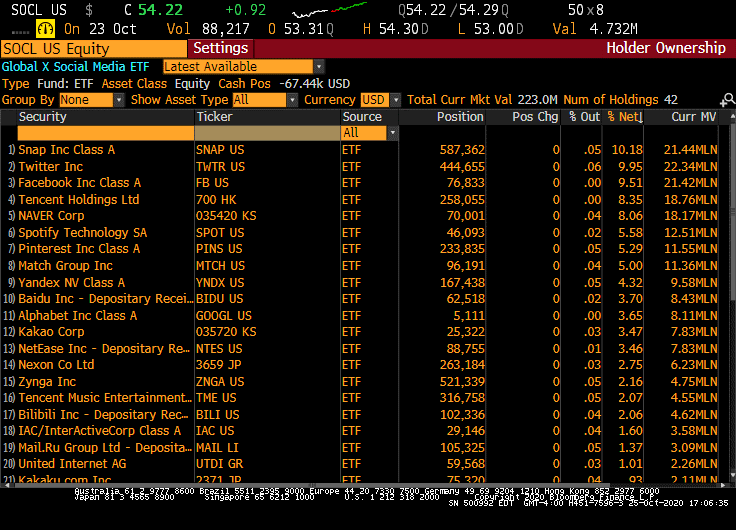Oct 26, 2020
Larry Berman: Social media, Big Data, Big Tech and antitrust
By Larry Berman
Larry Berman on social media stocks and antitrust
There is little doubt that when you are not paying for a service, you are the product. Have a look at the SOCL Global X Social Media ETF and the top holdings. How many of these services do you use?
Ask yourself how much you pay to use any of them. Now look at their valuations. The group trades at 6.6-times sales and 164-times earnings. The vast majority of them do not pay a dividend.

Most of these companies report earnings in the next few weeks. It will be interesting to see if they comment on those numbers.
Now let’s look at the antitrust lawsuit filed this week against Alphabet Inc. in the U.S. Congress. Google must respond to the U.S. Justice Department’s antitrust lawsuit by Dec. 19, according to a court filing on Friday. The Justice Department on Tuesday sued the US$1-trillion company and accused it of illegally using its market muscle to hobble rivals in the biggest challenge to the power and influence of Big Tech in decades. Google called the lawsuit “deeply flawed.”
The big focus of antitrust is harm to the consumer and competition. Some think this is a non-issue in Google’s case, that it will result in a fine, some modifications and that the company will move on like we saw years ago with Microsoft search and monopoly around their suite of products. I think it is part of the bigger picture that includes big business and inequalities that have developed over the “internet age.”
Make no mistake, internet search is a huge plus to consumers. But the harm comes when you are not actually getting an unbiased result. This will take years to get through and won’t likely mean much in the short run, but it should launch years of increased regulation and lower profit margins for an industry priced for perfection.
It’s hard to argue the harm to consumers on the cost side to be sure, but it’s a growing undercurrent as technology advances. Very few people pay for any of these services. Search and online commerce will only increase in the future (the pandemic has accelerated the clock). Who controls that introduction to online sales is a massive influence and revenue source for most of these companies.
One of the policies I liked from the Trump administration is that it aimed to make doing business easier by lowering the regulatory burden on businesses. But there is a point where monopoly issues need some intervention. As much of a libertarian as I am, fostering competition is an important function of free markets. We have likely arrived at the point where governments need to get more involved it seems and the fact that a handful of companies are such a large part of the marketplace is a huge issue contributing to inequality. You may disagree, but I see it as part of the structural problem that will limit the ability of many of these companies to get bigger. When priced for perfection and facing a growth challenge, the risks are growing.
A second important concern of the online world is Section 230 of the U.S. Communications Decency Act. It says that "no provider or user of an interactive computer service shall be treated as the publisher or speaker of any information provided by another information content provider."
The combination of these two important influences on the social media sector should be an increasing focus for investors. It seems the speculation in the sector is getting extreme. Snap Inc.’s recent rally is a good example: It’s trading above consensus forward analysts price targets yet it makes no money (so far). The recent high-profile failure of Quibi is interesting. This was a service that people had to pay for. To solve section 230 issues, we can see some of these services being forced to charge users so that anonymity issues can be addressed, which is a game-changer.
How much would you pay per month to post silly pet pictures? How much would you pay to watch them?
The Berman’s Call virtual roadshow is back on. You can see all the replays here. Sign up for the series at www.etfcm.com every Thursday at 7pm ET through Dec 3. There will be lots of opportunity to ask questions of markets and your favourite ETFs and stocks.
Follow Larry online:
Twitter: @LarryBermanETF
YouTube: Larry Berman Official
LinkedIn Group: ETF Capital Management
Facebook: ETF Capital Management
Web: www.etfcm.com








